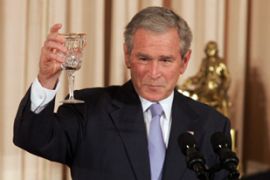‘Under seige’
But many Middle East politicians and demonstrators have said the talks have little chance of success.
Jacky Rowland, Al Jazeera’s correspondent in Gaza, said: “Here … people are living under siege [with] air strikes and tanks shells fired into Gaza in the last 24 hours, and they feel what is happening in the US has nothing to do with them at all.
“Palestinians are sick and tired and feeling pessimistic.
“They feel they have no future of Gaza and they need to get out, but they cannot, because they are locked in by Israel.”
Nour Odeh, Al Jazeera’s correspondent in Annapolis, said that there lacked clarity about what the parties are hoping to get out of this conference.
“We’re not really certain what will come out of Annapolis … There isn’t even an agreement on the framework between Palestinians and Israelis,” she said.
“They haven’t been able to agree on what they will discuss in Annapolis or what they will do the day after Annapolis which many people are saying is more important than Annapolis itself.
Politicians told Al Jazeera little would come of Annapolis.
‘Deja vu’
Mustafa Barghouti, the former Palestinian information minister, said Annapolis was “deja vu” and it was unlikely any real agreement would be reached “as long as there is no serious pressure on Israel to end occupation … and be forced to respect international law”.
Mark Regev, a spokesman for the Israeli foreign ministry, conceded that it would be “artificial and unrealistic to think you can solve all the issues in a few days”.
Michael Tarazi, a former adviser to the Palestine Liberation Organisation, told Al Jazeera: “It would be a mistake to think that anything meaningful is going to come out of these talks.
“This is a conference where people are going to talk about beginning to talk.
“The real important thing is not what happens at Annapolis, but rather what happens the day after – is there really going to be momentum to address the really thorny issues?”
Bush said in a meeting with Ehud Olmert, Israel’s prime minister, that he was “optimistic” and “looking forward to continuing our serious dialogue with you and the president of the Palestinian Authority to see whether or not peace is possible”.
‘Great hope’
Olmert said “this time it’s different” as there were so many participants in the conference.
 |
Hamas denounced the talks and refused to
be bound by any decisions made there [AFP] |
Bush also met Mahmoud Abbas, the Palestinian president, on Monday, telling him that “the United States cannot impose our vision but we can help facilitate”.
Abbas was also upbeat, saying he had “a great deal of hope” for Tuesday’s talks.
But protests in Jerusalem and Gaza on Monday denouncing any concessions stand in contrast to the positive tone as does the Palestinian and Israeli delegations’ continued inability to produce a joint statement setting out the direction of future peace talks.
In Jerusalem on Monday, thousands of Israelis, many of them settlers in the West Bank, protested against the talks and in support of Jewish settlements in the occupied territories.
Gathering at the Western Wall – the holiest site for Jews to pray – they also prayed that the talks would fail.
‘Loud’ protests
Al Jazeera’s David Chater, at the scene of protests in Jerusalem, said the demonstrators were the voice of the minority but that voice was loud and could threaten Olmert’s coalition government.
Members from government coalition party Yisrael Beitenu attended the protest, as did Zeev Elkin, a member of Olmert’s Kadima party.
In Gaza, some 2,000 supporters of Hamas, which has not been invited to Annapolis, took to the streets as well.
Ismail Haniya, the Palestinian prime minister whom Abbas fired, joined protesters in saying the president had no right to make concessions.
He expressed “the conviction of the Palestinian people that the Annapolis conference is useless”.
“Consequently, any decisions this conference might reach which affect the rights and principles of the Palestinian people and nation will not be binding for our people. They will be binding only for those who signed them,” Haniya said.



